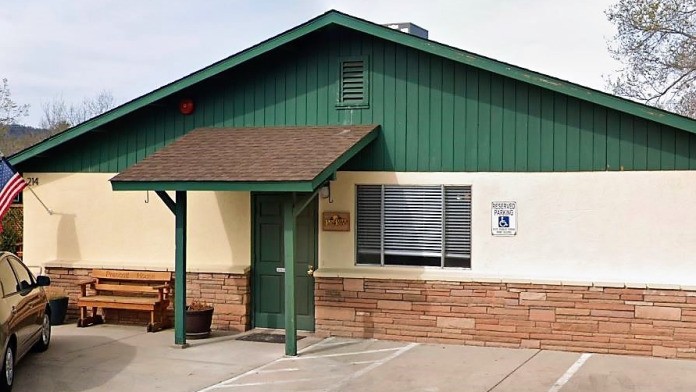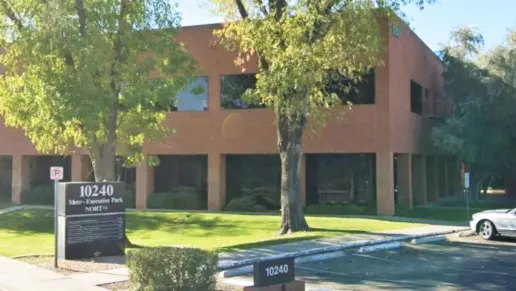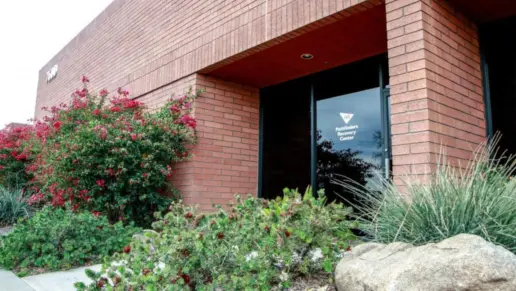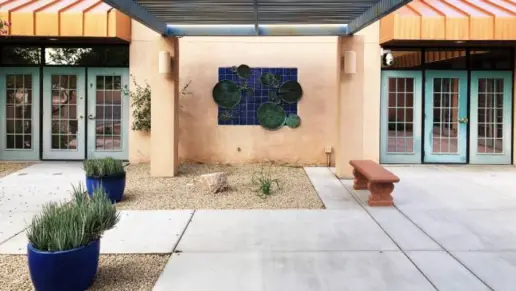Prescott House gave me the tools necessary to succeed in my recovery. The therapists and staff helped me to learn about how to live without addictions. They saved my life with their support and love.
About Prescott House
Prescott House is an alcohol and drug rehab center for adults in Prescott, Arizona. They specialize in holistic and evidence based therapies designed to help you break your dependency on chemical substances. Their programs include medically supervised detox, residential treatment, and aftercare support.
I like that this facility treats more than just the physical symptoms of addiction. During your initial consultation with your care team, they’ll try to learn more about your personal history and your goals for the future. Then, they’ll create a custom treatment plan to help you identify and address the root causes of your substance abuse. Here, they focus on whole body wellness and mental health support, making sure you receive care that specifically caters to your needs.
Their residential facility is comfortable and homey, with modern rooms and spacious gathering areas. When you’re not socializing with others, you’ll attend individual, group, and family counseling sessions. They also offer natural healing programs on site, including yoga and meditation.
Most people stay in this program for 30 to 90 days, depending on the level of care and attention they require. Before you leave treatment, your team will work with you to cover your next steps. Their aftercare services include ongoing counseling sessions, relapse prevention training, and connections to community providers.
One former client said this center gave him a fresh start and a life building experience. Multiple clients credit the team here for saving their lives and helping them achieve long term recovery.
Rehab Score
Gallery

Location
Accepted Insurance
Other Forms of Payment
Private insurance refers to any kind of healthcare coverage that isn't from the state or federal government. This includes individual and family plans offered by an employer or purchased from the Insurance Marketplace. Every plan will have different requirements and out of pocket costs so be sure to get the full details before you start treatment.
Self-pay involves paying for treatment out of your own pocket. You can use savings or credit, get a personal loan, or receive help from family and friends to fund your treatment. If you don't have insurance or your insurance plan doesn't cover a specific program, self-pay can help ensure you still get the care you need.
Addiction Treatments
Levels of Care
Treatments
The goal of treatment for alcoholism is abstinence. Those with poor social support, poor motivation, or psychiatric disorders tend to relapse within a few years of treatment. For these people, success is measured by longer periods of abstinence, reduced use of alcohol, better health, and improved social functioning. Recovery and Maintenance are usually based on 12 step programs and AA meetings.
Drug rehab in Arizona is the process of treating individuals who are dependent on a particular addictive drug. Because addiction is complex, this treatment typically includes a variety of interventions that address the many physical and emotional issues involved.
Many of those suffering from addiction also suffer from mental or emotional illnesses like schizophrenia, bipolar disorder, depression, or anxiety disorders. Rehab and other substance abuse facilities treating those with a dual diagnosis or co-occurring disorder administer psychiatric treatment to address the person's mental health issue in addition to drug and alcohol rehabilitation.
A combined mental health and substance abuse rehab has the staff and resources available to handle individuals with both mental health and substance abuse issues. It can be challenging to determine where a specific symptom stems from (a mental health issue or an issue related to substance abuse), so mental health and substance abuse professionals are helpful in detangling symptoms and keeping treatment on track.
Opioid rehabs specialize in supporting those recovering from opioid addiction. They treat those suffering from addiction to illegal opioids like heroin, as well as prescription drugs like oxycodone. These centers typically combine both physical as well as mental and emotional support to help stop addiction. Physical support often includes medical detox and subsequent medical support (including medication), and mental support includes in-depth therapy to address the underlying causes of addiction.
Programs



Clinical Services
Cognitive Behavioral Therapy (CBT) is a therapy modality that focuses on the relationship between one's thoughts, feelings, and behaviors. It is used to establish and allow for healthy responses to thoughts and feelings (instead of unhealthy responses, like using drugs or alcohol). CBT has been proven effective for recovering addicts of all kinds, and is used to strengthen a patient's own self-awareness and ability to self-regulate. CBT allows individuals to monitor their own emotional state, become more adept at communicating with others, and manage stress without needing to engage in substance abuse.
Prescott House offers expressive art classes that allows for a structured, professional and above all else, fun environment for creation, expression and interpretation through multiple art mediums. Throughout these classes – which residents love – the facility teaches that art is about the process, and not the product. This is a great segue into art as it teaches those with less experience in creating artistic pieces that the final product is really just a subset of the process, not the most important part of the therapy. In short, quality is far less important than the therapeutic healing that takes place during the creation process.
Dialectical Behavior Therapy (DBT) is a modified form of Cognitive Behavioral Therapy (CBT), a treatment designed to help people understand and ultimately affect the relationship between their thoughts, feelings, and behaviors. DBT is often used for individuals who struggle with self-harm behaviors, such as self-mutilation (cutting) and suicidal thoughts, urges, or attempts. It has been proven clinically effective for those who struggle with out-of-control emotions and mental health illnesses like Borderline Personality Disorder.
Eating disorders include anorexia, bulimia, binge eating, and dysfunctional eating patterns. Many psychologists and other mental health professionals consider eating disorders to be food addictions, meaning food is being used in an addictive way (similar to drug or alcohol addiction). Certain substance abuse treatment programs will have treatment for eating disorders as one of the services offered. An eating disorder may also present as a co-occuring disorder or dual diagnosis alongside drug and alcohol addiction.
One of the therapies the facility provides with great success is equine therapy. This form of therapy is led by Nina Ekholm Fry, MSSc. and features an approach that they find to be quite beneficial for each residents. Equine therapy revolves around the use of horses to provide a nonjudgmental and trusting partner for a resident to take care of. By feeding, brushing, and caring for another living being, it often helps to alleviate the pressures of stress and anxiety on newly sober residents.
Experiential therapy is a form of therapy in which clients are encouraged to surface and work through subconscious issues by engaging in real-time experiences. Experiential therapy departs from traditional talk therapy by involving the body, and having clients engage in activities, movements, and physical and emotional expression. This can involve role-play or using props (which can include other people). Experiential therapy can help people process trauma, memories, and emotion quickly, deeply, and in a lasting fashion, leading to substantial and impactful healing.
EMDR is a therapeutic modality originally developed to help process trauma. In an EMDR session, a patient is prompted to undergo eye movements that mimic those of REM sleep. This is accomplished by watching a therapist's finger move back and forth across, or following a bar of light. The goal is repetitive sets of eye movements that help the brain reprocess memory, which can significantly reduce the intensity of remembered traumatic incidents. Associated memories can heal simultaneously, leaving patients significantly calmer, more stable, and more emotionally relaxed.
After the first month of treatment each client and his primary therapist will begin to prepare for a family weekend that will include family therapy and, in many cases, a weekend experience together away from the facility. The facility ask that families be available for sessions on Thursday night as well as Friday and Monday mornings for that weekend.
Fitness therapy blends exercise with psychotherapy for a fun, inspiring, and effective way of treating addiction and other issues. By incorporating movement into counseling sessions, clients become more empowered, motivated, and goal-oriented, all while strengthening their bodies and becoming more flexible. Fitness Therapy is usually used to complement a course of treatment (inpatient or outpatient) to make it even more successful. Increasing the connection between a patient’s mind and body helps both with healing as well as in creating new, healthy habits.
Prescott House also provides a variety of other group treatment activities like expressive arts, yoga, equine therapy, as well as nutrition groups. Each session is meant to help clients build a stronger foundation of recovery so they have the best chances of staying sober when discharge. Clients will learn different methods to handle triggers, stress, and issues faced in everyday life.
At Prescott House, clients will be assigned a personal therapist as well. The personal therapist will meet patients for an hour per week as well as any other time they may need someone to talk to. Individual therapy is there to provide a safe place to talk about life in order to work through any specific issues. While some moments in therapy may seem uncomfortable, it’s important to examine unresolved issues to understand what may be fueling addiction.
Life skills trainings involve all the skills a person must have in order to function successfully in the world. These include time management, career guidance, money management, and effective communication. Truly successful addiction recovery is based on the ability to not only live substance-free, but to thrive. Life skills teaches the practical necessities of functioning in society, which sets clients up for success in life, and therefore sobriety.
Motivational Interviewing (MI) is a clinical approach to helping people with substance abuse issues and other conditions shift behavior in positive ways. It is more goal-oriented than traditional psychotherapy, as MI counselors directly attempt to get clients to consider making behavioral change (rather than wait for them to come to conclusions themselves). Its primary purpose is to resolve ambivalence and help clients become able to make healthy choices freely.
The benefit of a well-balanced diet on the body is well-documented. Rather than spending time talking about specific nutrients and dietary patterns clients should follow, the facility focuses on how nutrition helps them specifically in regards to recovery. Prescott House believes that a combination of therapy is the best form of treatment, and as such they rely on treating the body and the mind rather than only targeting symptoms of addiction or mental health. One of these professionals is our certified nutritionist, Victoria Abel, Addiction Nutritionist MA, MNT, CAN. Victoria has been practicing in the field of addiction for over a decade. She has worked as a therapist in primary chemical dependency treatment as well as mental health conditions such as the treatment of eating disorders including body dysmorphia disorder, anorexia nervosa and bulimia. She specializes in addressing addiction through nutrition and to follow through on this mission she created the Center for Addiction Nutrition, which teaches clients and professionals about the common interactions with chemicals, food and their overall effect on health, and in particular – mood.
Trauma therapy addresses traumatic incidents from a client's past that are likely affecting their present-day experience. Trauma is often one of the primary triggers and potential causes of addiction, and can stem from child sexual abuse, domestic violence, having a parent with a mental illness, losing one or both parents at a young age, teenage or adult sexual assault, or any number of other factors. The purpose of trauma therapy is to allow a patient to process trauma and move through and past it, with the help of trained and compassionate mental health professionals.
Amenities
-
Private Setting
-
Lakeside
-
Yoga Studio
-
Private Transportation
-
Hiking
Accreditations

The Commission on Accreditation of Rehabilitation Facilities (CARF) is a non-profit organization that specifically accredits rehab organizations. Founded in 1966, CARF's, mission is to help service providers like rehab facilities maintain high standards of care.
CARF Accreditation: Yes
Accreditation Number: 261861

The Joint Commission, formerly known as JCAHO, is a nonprofit organization that accredits rehab organizations and programs. Founded in 1951, the Joint Commision's mission is to improve the quality of patient care and demonstrating the quality of patient care.
Joint Commission Accreditation: Yes
Accreditation Number: 613364

The National Association of Addiction Treatment Providers (NAATP) is a professional association that represents organizations in the field of addiction services. Founded in 1978, NAATP's mission is to advance addiction services and ensure that high-quality addiction treatment is available and accessible.
NAATP Member: Yes
Member ID: 416

State Licenses are permits issued by government agencies that allow rehab organizations to conduct business legally within a certain geographical area. Typically, the kind of program a rehab facility offers, along with its physical location, determines which licenses are required to operate legally.
State License: Arizona
License Number: OTC6470
Contact Information
214 North Arizona Avenue
Prescott AZ, 86301









